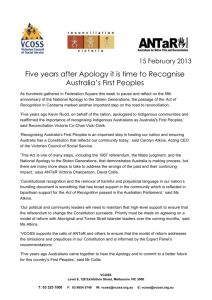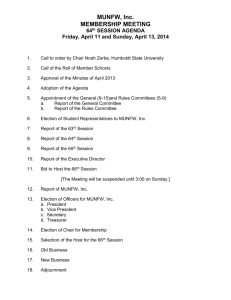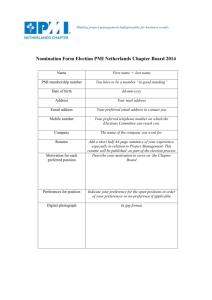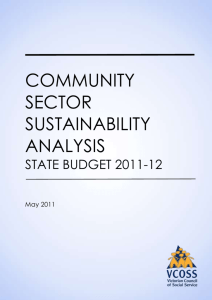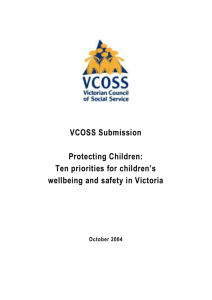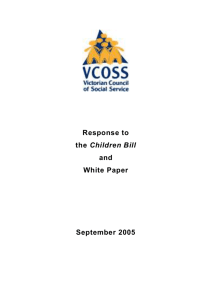SSTG questionnaire analysis
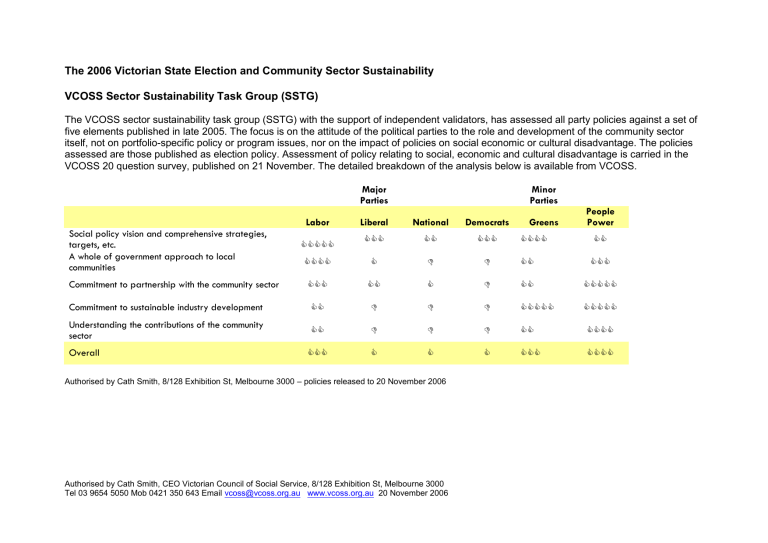
The 2006 Victorian State Election and Community Sector Sustainability
VCOSS Sector Sustainability Task Group (SSTG)
The VCOSS sector sustainability task group (SSTG) with the support of independent validators, has assessed all party policies against a set of five elements published in late 2005. The focus is on the attitude of the political parties to the role and development of the community sector itself, not on portfolio-specific policy or program issues, nor on the impact of policies on social economic or cultural disadvantage. The policies assessed are those published as election policy. Assessment of policy relating to social, economic and cultural disadvantage is carried in the
VCOSS 20 question survey, published on 21 November. The detailed breakdown of the analysis below is available from VCOSS.
Labor
Major
Parties
Liberal
Minor
Parties
National Democrats Greens
People
Power
Social policy vision and comprehensive strategies, targets, etc.
A whole of government approach to local communities
Commitment to partnership with the community sector
Commitment to sustainable industry development
Understanding the contributions of the community sector
Overall
Authorised by Cath Smith, 8/128 Exhibition St, Melbourne 3000 – policies released to 20 November 2006
Authorised by Cath Smith, CEO Victorian Council of Social Service, 8/128 Exhibition St, Melbourne 3000
Tel 03 9654 5050 Mob 0421 350 643 Email vcoss@vcoss.org.au
www.vcoss.org.au
20 November 2006
Community sector sustainability questionnaire – narrative
1. Social Policy Vision
ALP - 5 - comprehensive vision with comprehensive programs and strategies with targets and indicators
LIB – 3 - Limited overall social policy framework, diverse range of policies
NAT –2 - Comprehensive range of policy elements, vision is limited compared with full social/systemic analysis
DEM - 3 – broad and comprehensive vision, lack of specific policies and strategies (with targets and indicators) published as election policy
GREEN – 4 - Strong policy vision, comprehensive range of policies, less explicit re targets and strategies
People power – 2 -Social policy areas diverse but overall framework published as election policy doesn’t cover full systemic/social analysis
2. Whole of Government approach to local communities
ALP – 4 - Specific commitments in Fairer Victoria
LIB – 1 - Few specific commitments in election policies other than e.g. mention of importance of local communities in some policy areas
NAT – 0 – Silent in published election policy
DEM – 0 – Silent in published election policy
GREEN - 4 – Generally strong policy platform – but cannot find explicit commitment to evaluate area based initiatives and implement local area planning agreements in published election policy
People power – 3 -query comprehensiveness of policies, and not explicit re whether local area based initiatives will be evaluated.
3. Commitment to partnership with community sector
ALP – Strengthening Community Orgs (SCOP) initiative and identified spokesperson for matters affecting the sector (as well as specific social policy portfolio spokespeople). Nothing explicit re compa ct or ‘whole of government’ partnership (may occur as part of SCOP but no specific commitment as yet)
LIB – 2 – recognition of sector in e.g. consumer policy, neighbourhood houses policies, but somewhat piece-meal. Seeking to develop broader strategy with sector.
NAT -1 – Identified spokesperson, but silent on other elements
DEM - 0 – silent in published election policy
GREEN – 3 commitment to compact, explicit re recognition but not explicit re spokesperson for the sector (as opposed to the various services) or formal advisory body
People Power - 5 – explicit commitments on all elements
4. Commitment to sustainable industry development
ALP – 0 - No specific commitment to these elements (may occur as part of SCOP but no specific commitment as yet)
LIB – 0 silent in published election policy. Seeking to develop broader strategy with sector.
NAT – 0 -silent re resources for evidence based policy and sector research
DEM- 0 – silent in published election policy
GREEN – 5 – specific commitments on all elements
People Power – 5 – specific commitments on all elements
Authorised by Cath Smith, CEO Victorian Council of Social Service, 8/128 Exhibition St, Melbourne 3000
Tel 03 9654 5050 Mob 0421 350 643 Email vcoss@vcoss.org.au
www.vcoss.org.au
20 November 2006
5. Understanding the contributions of the community sector
ALP – limited specific commitment to research/evaluation resources on development of the sector itself, aside from the limited published material on SCOP
LIB -0 - silent in published election policy. Seeking to develop broader strategy with sector.
NAT – 0 – silent re resources for evidence based policy and sector research
DEM - 0 – silent in published election policy
GREEN – 2 - specific on evaluation and evidence based policy but not explicit on understanding the sector itself (as opposed to social policy issues) and its contributions
People Power – 4 – one mark taken off as not clear whether addresses SSTG element of ‘strategy’ regarding these elements or whether just a ‘commitment’.
Average
ALP – 3 Comprehensive range of policies (but some not yet released), with targets and indicators; local planning well covered; lacking explicit election policy regarding SSTG elements such as compact and industry plan.
LIB- 1 Comprehensive range of policies, under a less systemic vision; lacking explicit election policy regarding some SSTG elements – recognises role of sector in some policies but somewhat piece-meal. Key spokesperson advises that the party seeks to develop a broader strategy with the sector.
NAT -1 – Comprehensive range of policies, under a less systemic vision; lacking explicit election policy regarding some SSTG elements
DEM -1 Broad vision but lacking explicit election policy regarding SSTG elements
GREEN – 3 strong on vision, less explicit on targets, silent on some SSTG elements, strong on compact.
PEOPLE POWER - 4 weaker on vision - less comprehensive and strategic, SSTG specific elements well covered.
Authorised by Cath Smith, CEO Victorian Council of Social Service, 8/128 Exhibition St, Melbourne 3000
Tel 03 9654 5050 Mob 0421 350 643 Email vcoss@vcoss.org.au
www.vcoss.org.au
20 November 2006
